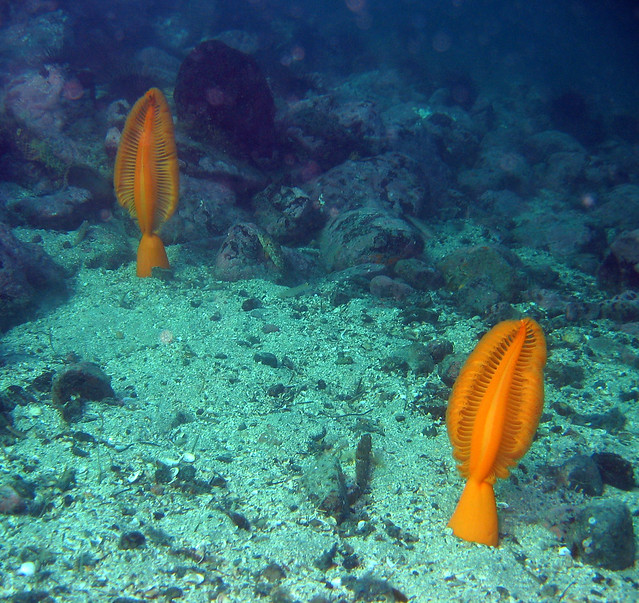Okeanos Explorer has begun Leg 4 into the Northern Hawaiian Islands and their last stream on Sunday was chock full of amazing vistas full of deep-sea (about 400-500 m) sea pens and corals!
Probably one of the most exciting parts of these cruises is that I'm able to actually watch my favorite starfish species, some of which I described, in ACTION! Feeding on what turns out is their favorite food: octocorals!!
I've documented sea stars feeding on octocorals from the Atlantic Okeanos expeditions before (here). and many of the species are the same.
Sea pens are big fleshy octocoral colonies that look sort of like an aquatic "quill" or pen. Here's one called Ptilosarcus, which occurs in shallow water from about SCUBA depth.
Octocorals are specific type of cnidarian, which have eight arms on each polyp. They have a whole diversity of body forms and can be more colonial, such as this gorgonian or more like a big fleshy stick like the sea pens seen above..
A big peripheral ring of plates frames their body. They can be anything from completely pentagonal to more star shaped. Many are covered by spines whereas others are not..
Among the best known of shallow-water goniasterid octocoral predators is the so called "spiny star" aka Hippasteria phrygiana (aka Hippasteria spinosa, etc.), which used to be known by MANY species before being recognized as one wide-spread species which occurs in three oceans! (here).
This species occurs at SCUBA depth (and deeper) and many, involved studies have documented how these animals are important parts of ecosystems due to their predation on sea pens.
Thus, it makes a lot of sense that several of the deeper water species of Hippasteria, such as this Hippasteria imperials seen by the Okeanos Explorer should be a fairly active predator on deep-sea sea pens!
Disks are swollen with water...
Here is just a gorgeous shot showing a seemingly endless vista of sea pens with these two large, Hippasteria imperialis roaming around like they own the place!
This big guy is Hippasteria muscipula! A species I just described last year! (here) It would seem to occur over a pretty wide depth range..from several hundreds to several THOUSANDS of meters!
They seem to be primarily predators on bamboo "corals" which are octocorals in the family Isididae.
and there was THIS stunning image showing H. muscipula but with 3 polynoid worms crawling around on its body surface. This is unusual, since polynoid worms usually crawl on the oral surface in the tube foot grooves..

Another closely related Hippasteria-like sea star which we've seen in the Hawaii region is the genus Evoplosoma.

We've seen plenty of examples of Evoplosoma feeding in the Atlantic as well as parts of the Pacific.
This shot is just awesome. We can see its stomach and tube feet hard at work clearing off the meat from the bamboo coral's stalk..
BUT that's not all! We've encountered multiple goniasterid species apparently feeding on coral!
1. Astroceramus eldredgei
Its a relatively shallow water animal (about 266-429 meters) compared to some of the other goniasterids here... None known below 500 m.
2. Calliaster pedicellaris
This species was described by Walter K. Fisher in 1906 and VERY rarely seen since then.
3. Circeaster pullus
Here's another species I described back in 2006 and named in honor of Dr. Craig Young at the Oregon Institute of Marine Biology. It was observed perched on this coral skeleton where it was presumably feeding..
Have not seen any of these on the Okeanos dives as yet though.
4. Circeaster arandae?
This one was a surprise because it very much looks like a species I described in 2006 from Madagascar!! But it lives in deep, DEEP water (>1000 m) which is consistent with my earlier account. But weird to find it so far off..














No comments:
Post a Comment